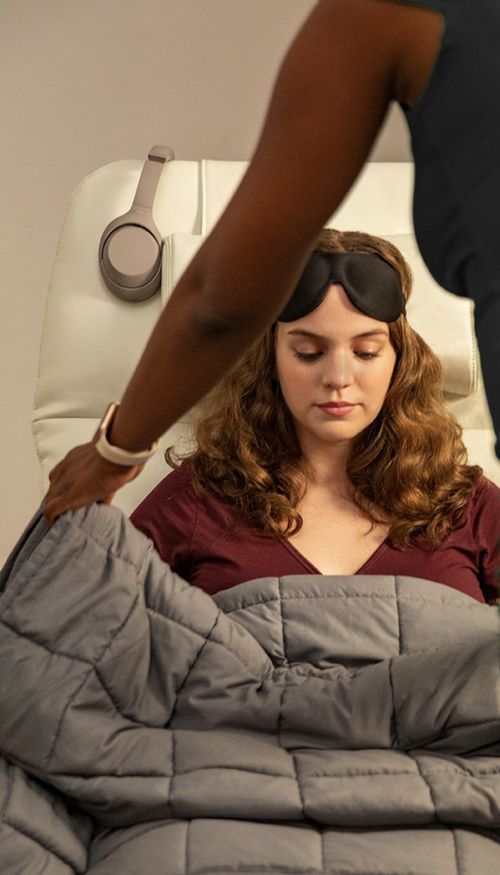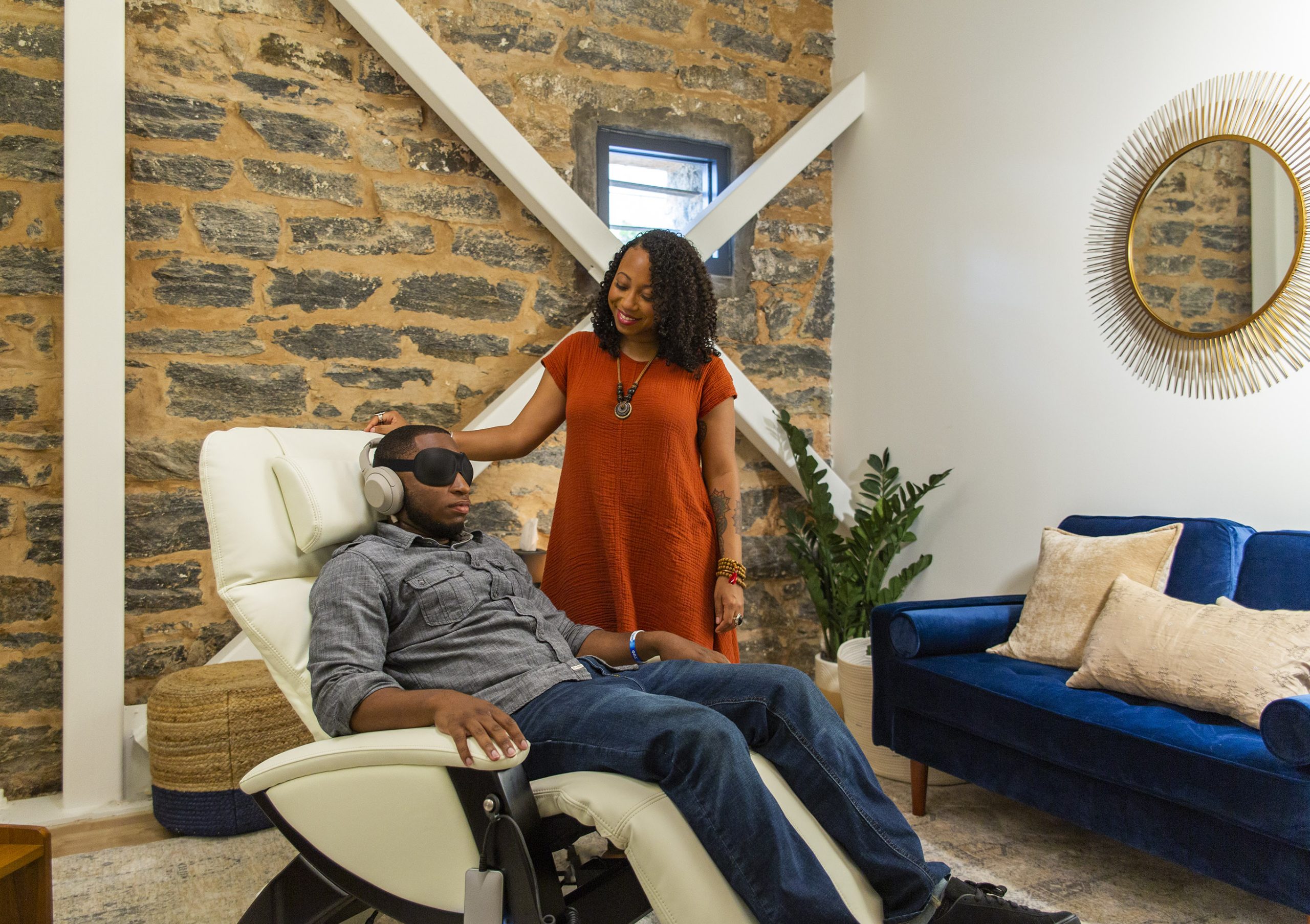Your Psychedelic-Assisted Therapy (PAT) program uses a low dose psychedelic within a carefully supervised therapeutic process. Each care plan is personalized, pairing medicine-supported sessions with psychotherapy to help explore emotions, patterns, and experiences in a safe clinical setting. Some clients describe these sessions as offering new perspectives or insights that they can continue to reflect on over time.¹ Individual experiences vary and are subjective.
Psychedelic therapy is often considered by individuals who have tried standard treatments—such as medication and talk therapy—without the level of relief they were hoping for. People may explore PAT while navigating:








If you have questions about whether this form of care aligns with your needs, our clinical team will review this with you during your consultation.
described noticing some form of personal or emotional shift during their program.²
reported that the shifts they experienced continued for at least one month after completing their sessions.³ These observations reflect individual experiences within our program and are not predictive of clinical outcomes.
Psychedelic therapy has been studied in clinical research for its rapid effects on mood-related symptoms. Some clients describe feeling shifts earlier in their program compared to traditional approaches, though experiences vary from person to person.
Psychedelic therapy utilizes a low dose, legally prescribed psychedelic which is administered in our clinics by trained medical professionals. Your clinician monitors your physical and psychological safety throughout each session, and any potential side effects are reviewed with you in advance. Most effects—such as drowsiness, temporary changes in awareness, or mild nausea—tend to be short-lived.
Our clinics are designed to help you feel calm and grounded. From comfortable seating to curated music and lighting, the setting is meant to support reflection and therapeutic work.
Your treatment plan—including preparation, dosing, and integration sessions—is customized to your goals. Your therapist works with you to explore emotional themes, patterns, and insights that arise throughout the program.
Our team has delivered thousands of sessions using this therapeutic model. Your program includes a prescribing clinician, registered nurse, and therapist trained in psychedelic-assisted therapy principles.
Our spa-like retreats are intentionally designed to evoke feelings of comfort and reduce stress or anxiety.
FEATURES
Your journey begins with a discovery call, followed by a secure intake and a medical consultation. During this assessment, our team reviews your health history and discusses whether this treatment plan may be appropriate for your situation.
You’ll meet your dedicated therapist to build trust, clarify goals, and prepare emotionally before your first psychedelic-assisted therapy session. These early sessions help set a foundation for the work ahead.
During dosing sessions, a low dose psychedelic is administered in a medically supervised setting. Your therapist remains present throughout the experience to offer support, provide grounding tools, and help you navigate thoughts or emotions that arise.
Following each dosing session, you’ll meet with your therapist to explore themes, insights, and emotional patterns. Integration helps translate the experience into meaningful day-to-day understanding.
After completing your core sessions, we review progress together and discuss whether ongoing therapy, group support, or maintenance care may be appropriate for your goals.


Our structured treatment plan includes a series of preparation, dosing, and integration sessions delivered within a medically supervised framework. The program brings together multiple sessions because this format is commonly used in psychedelic-assisted psychotherapy and allows for ongoing therapeutic support throughout the process.
Our protocol offers either 6 or 9 clinician-supervised dosing sessions with a low dose psychedelic, paired with psychotherapy before and after each dose. This team-based approach provides consistent medical oversight and therapeutic guidance at each stage of care.
With essential support & guidance.
50 minutes
2 - 2.5 hours/session In-Clinic with your dedicated Field Trip therapist present throughout the experience.
Consider Discovery Plus for additional post-therapy support.
30 minutes/session
For additional support & guidance.
50 minutes
2 - 2.5 hours/session In-Clinic with your dedicated Field Trip therapist present throughout the experience.
With your dedicated Field Trip therapist present throughout the experience.
30 minutes/session
Tailored to your needs
(50 mins)
2 - 2.5 hours/session In-Clinic with your dedicated Field Trip therapist present throughout the experience.
With your dedicated Field Trip therapist present throughout the experience.
30 minutes/session
For additional support & guidance.
Tailored to your needs
(50 mins)
2 - 2.5 hours/session
In-Clinic
With your dedicated Field Trip therapist present throughout the experience.
With your dedicated Field Trip therapist present throughout the experience.
With your dedicated Field Trip therapist present throughout the experience.
50 minutes/therapy session
In-Clinic/Virtual
With your dedicated Field Trip therapist.
With your dedicated Field Trip therapist.
30 minutes/session
A 15-minute call with our team can help you understand:
1. Which program may be appropriate
2. Whether your therapist’s services may be eligible for extended health benefits
3. Available monthly financing options
Whether you’re navigating long-standing emotional patterns, stress, trauma-related experiences, or feeling stuck despite previous therapy, our team is here to help you explore your options safely and thoughtfully.
Some clients describe experiences such as increased self-reflection, emotional shifts, or a greater sense of compassion toward themselves during or after the program. Others have noted changes in how they relate to stress, physical or emotional discomfort, or long-standing patterns — though experiences vary widely.
Our therapists are trained in psychedelic-assisted approaches in addition to their professional credentials. Their role is to help you explore and make meaning of your experiences, support emotional processing, and consider how insights might relate to your daily life. They provide guidance and grounding throughout the process.
Psychedelic-assisted psychotherapy is different from traditional medication-based approaches. Research has explored how psychedelics may influence certain brain pathways and how these temporary changes may relate to shifts in perception, mood, or cognitive flexibility for some people. Effects vary from person to person, and responses unfold differently across individuals.
During supervised dosing sessions, clients receive a monitored dose of a psychedelic medicine that may produce altered or psychedelic-like experiences. Many people describe these experiences as providing new perspectives or allowing deeper emotional exploration. These sessions are followed by integration therapy, where insights can be reflected upon and discussed.
Suitability is determined through a clinical assessment, and experiences depend on dose, individual factors, and therapeutic support. Some people notice shifts earlier in their program, while others experience gradual changes over multiple sessions.
A growing body of research has examined how low-dose psychedelics may influence symptoms related to depression, trauma-related challenges, and certain patterns related to substance use — especially when combined with psychotherapy. Responses vary, and results from research do not predict individual outcomes.
Studies comparing low-dose psychedelics alone to low-dose psychedelics combined with psychotherapy suggest that combining approaches may support therapeutic work for some people. Much of the existing research has focused on the medicines alone without psychotherapy, but observational findings and retrospective analyses — including internal clinic data — indicate that clients may find value in pairing the two.
Depression & Mood-Related Research
• Clinical trials have examined the short-term impact of low-dose psychedelics on people experiencing depressive symptoms, including those who have not responded to other treatments.
• Research has compared low-dose psychedelics to electroconvulsive therapy (ECT), with findings showing different side-effect profiles and potential benefits for certain participants.
Suicidal Ideation
• Several studies have examined short-term changes in suicidal thoughts after low-dose psychedelic administration. Findings generally suggest rapid but temporary effects requiring clinical oversight.
PTSD & Trauma-Related Research
• Trials exploring low-dose psychedelics in individuals with trauma-related symptoms have reported meaningful shifts for some participants, though responses vary and remain an area of active study.
Alcohol-Use-Related Studies
• Early trials combining low-dose psychedelics with psychotherapy have reported encouraging findings related to alcohol use patterns, though this research is still emerging.
Overall, research continues to evolve. Psychedelic-assisted approaches remain an area of active investigation, and individual experiences differ widely.
No. Psychedelic-assisted psychotherapy is structured, supported, and clinically supervised. Clients participate in preparation sessions, receive medical monitoring during dosing, and engage in integration sessions afterward. Many people who use psychedelics on their own describe feeling overwhelmed or unsure of how to process their experience. In a supervised program, trained therapists help you explore emotions, sensations, and insights in a grounded and supportive way. This framework is a defining feature of psychedelic-assisted care.
We cannot eliminate all difficult experiences, but we work to create conditions that support comfort, safety, and emotional grounding. This includes thorough preparation, intention-setting, and a calming environment.
Your first dosing session typically uses a lower dose so you can become familiar with what the experience may feel like. Because psychedelic states can bring up challenging emotions or thoughts, having a therapist present helps you navigate anything difficult with support. Many clients find that these moments — while uncomfortable — sometimes become meaningful areas to explore in therapy.
Your care team will review all medications and substances during your consultation to determine what is safe and appropriate. Many people continue antidepressants or other mental-health supports during treatment, while others may require adjustments.
You may be asked to avoid certain substances — such as alcohol, cannabis, opioids, stimulants, sedatives, or muscle relaxants — for a period of time before your dosing sessions. These recommendations depend on your personal health history and are reviewed with the prescribing clinician.
Many clients are able to use extended health benefits toward the psychotherapy portion of their program, depending on their insurer and coverage limits. Psychotherapy is delivered by regulated professionals such as psychotherapists, clinical counsellors, social workers, or psychologists. We provide detailed receipts for reimbursement, and our team can help you understand which components of your care may qualify.
Psychedelic-assisted psychotherapy may not be suitable for individuals with:
An allergy to the applicable psychedelic
Pregnancy
A personal history of schizophrenia or psychosis
Uncontrolled hypertension
A severe recent head injury
Eligibility is always determined through a medical consultation.
No. Psychedelic-assisted psychotherapy is intended to complement — not replace — ongoing mental-health care. Many clients continue their existing therapy or medication during the program. Any decisions about changing a medication regimen are made with your prescribing clinician.
Our goal is to support meaningful therapeutic work within the program while helping you build insights, emotional skills, and coping strategies that you can continue to use with your broader care team.
No. In Canada, a referral is not required to begin the assessment process. Eligibility is determined through a medical consultation with our prescribing clinician.
1. Based on Field Trip Health Preliminary Data, 2020-2022
2. % of Field Trip clients with moderate to severe symptoms reporting improvements in symptoms after treatment who responded to Field Trip’s post-treatment questionnaire. Disclaimer: Please consult a physician or other medical professional before commencing treatment.
3. If you’d like to learn more about our treatment outcomes, read our white paper.
4. Phelps, J. (2017). Developing Guidelines and Competencies for the Training of Psychedelic Therapists.
5. A randomized, double-blind, active placebo-controlled study of efficacy, safety, and durability of repeated vs single subanesthetic psychedelic use for treatment-resistant depression. https://www.nature.com/articles/s41398-020-00897-0
6. A Double-Blind, Randomized, Placebo-Controlled, Dose-Frequency Study of Intravenous Psychedelics in Patients With Treatment-Resistant Depression. https://doi.org/10.1176/appi.ajp.2016.16010037